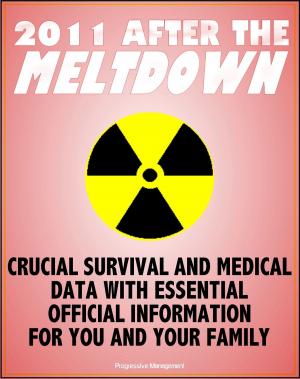21st Century Textbooks of Military Medicine - Military Medical Ethics (Two Volumes) - Foundations and Theories, Practical Examples, Nazi and Japanese Human Experiments (Emergency War Surgery Series)
Nonfiction, Health & Well Being, Medical, Reference| Author: | Progressive Management | ISBN: | 9781458097125 |
| Publisher: | Progressive Management | Publication: | April 27, 2011 |
| Imprint: | Smashwords Edition | Language: | English |
| Author: | Progressive Management |
| ISBN: | 9781458097125 |
| Publisher: | Progressive Management |
| Publication: | April 27, 2011 |
| Imprint: | Smashwords Edition |
| Language: | English |
From the much-referenced and highly acclaimed Textbooks of Military Medicine series, Military Medical Ethics addresses medical ethics within a military context, a heretofore essentially unexplored field. Both volumes of this massive work - with over 1200 pages - are presented. This textbook explores the ongoing tension between the medical profession and the profession of arms as experienced by the military physician, including an extensive and detailed discussion of the many lessons learned from previous wars. Topics range from discussions of traditional medical ethics, military ethics, and the unique field of military medical ethics, to a discussion of medicine gone awry, as exemplified by the Nazi doctors, the Japanese biomedical experimentation programs during the WWII era, and the radiation experiments conducted in the United States. The authors were selected based on their expertise in their respective academic disciplines. Some are uniformed officers; some are civilian academics. Many support military medicine; a few do not. Combined they provide a lively discussion of the topics covered in these two volumes. Although written for uniformed medical officers, this book is also particularly important for civilian medicine at this time in history.
From the Foreword: Military medical care is practiced across a wide spectrum of settings, ranging from garrison medicine, through deployments for Operations Other Than War (OOTW), and extending to massive deployments of personnel and materiel in a large-scale conventional war. Within a peacetime garrison setting, military medical ethics has many similarities to civilian medical ethics and usually uses the same decision-making processes. It is similar in that the patient–physician relationship is generally the same, as are the goals of therapy. Patient autonomy takes priority in clinical decisions. However, the very nature of the military mission, especially when it involves deployment or combat, precludes military medical ethics from being identical to civilian medical ethics. Within military medicine, there is a significant dichotomy between medicine’s healing and the military’s injuring. Conflicts can arise between duties to the patient and to the command structure. The battlefield introduces totally unique stressors and criteria for decision making. These differences demonstrate the need for these two volumes and their exploration will be its primary emphasis.
The study and discussion of military medical ethics is inherently controversial and troubling. Those who serve in the armed services understand the complexities and problems that the military mission can introduce to the delivery of effective medical healthcare. For instance, rarely does the issue of national security play a role in the day-to-day medical decisions in a civilian setting. The military, however, as the sentry and defender of the nation, is tasked with maintaining security. Survival of the nation can be a powerful driving force behind medical decisions, whether they are correct, just, or legal. One need look no further in our own past than the recently revealed radiation experiments from the Cold War era to understand this. Certainly the lessons to be learned from the perversion of medicine in Germany and Japan, both before and during World War II, are ones to be carefully examined and never forgotten. We constantly strive to remember those lessons, to learn from them, and to attempt to ensure that we do not repeat the travesties of the past. It is all too easy to look at others’ sins and be smug in our own virtue. While controversy is seldom comfortable, it should always be instructive. An excellent organization is willing to publicly examine and discuss its mistakes and to learn from them. Military Medical Ethics is offered in that spirit. These volumes may offend. They may stir emotions. They are intended to illuminate."
From the much-referenced and highly acclaimed Textbooks of Military Medicine series, Military Medical Ethics addresses medical ethics within a military context, a heretofore essentially unexplored field. Both volumes of this massive work - with over 1200 pages - are presented. This textbook explores the ongoing tension between the medical profession and the profession of arms as experienced by the military physician, including an extensive and detailed discussion of the many lessons learned from previous wars. Topics range from discussions of traditional medical ethics, military ethics, and the unique field of military medical ethics, to a discussion of medicine gone awry, as exemplified by the Nazi doctors, the Japanese biomedical experimentation programs during the WWII era, and the radiation experiments conducted in the United States. The authors were selected based on their expertise in their respective academic disciplines. Some are uniformed officers; some are civilian academics. Many support military medicine; a few do not. Combined they provide a lively discussion of the topics covered in these two volumes. Although written for uniformed medical officers, this book is also particularly important for civilian medicine at this time in history.
From the Foreword: Military medical care is practiced across a wide spectrum of settings, ranging from garrison medicine, through deployments for Operations Other Than War (OOTW), and extending to massive deployments of personnel and materiel in a large-scale conventional war. Within a peacetime garrison setting, military medical ethics has many similarities to civilian medical ethics and usually uses the same decision-making processes. It is similar in that the patient–physician relationship is generally the same, as are the goals of therapy. Patient autonomy takes priority in clinical decisions. However, the very nature of the military mission, especially when it involves deployment or combat, precludes military medical ethics from being identical to civilian medical ethics. Within military medicine, there is a significant dichotomy between medicine’s healing and the military’s injuring. Conflicts can arise between duties to the patient and to the command structure. The battlefield introduces totally unique stressors and criteria for decision making. These differences demonstrate the need for these two volumes and their exploration will be its primary emphasis.
The study and discussion of military medical ethics is inherently controversial and troubling. Those who serve in the armed services understand the complexities and problems that the military mission can introduce to the delivery of effective medical healthcare. For instance, rarely does the issue of national security play a role in the day-to-day medical decisions in a civilian setting. The military, however, as the sentry and defender of the nation, is tasked with maintaining security. Survival of the nation can be a powerful driving force behind medical decisions, whether they are correct, just, or legal. One need look no further in our own past than the recently revealed radiation experiments from the Cold War era to understand this. Certainly the lessons to be learned from the perversion of medicine in Germany and Japan, both before and during World War II, are ones to be carefully examined and never forgotten. We constantly strive to remember those lessons, to learn from them, and to attempt to ensure that we do not repeat the travesties of the past. It is all too easy to look at others’ sins and be smug in our own virtue. While controversy is seldom comfortable, it should always be instructive. An excellent organization is willing to publicly examine and discuss its mistakes and to learn from them. Military Medical Ethics is offered in that spirit. These volumes may offend. They may stir emotions. They are intended to illuminate."















